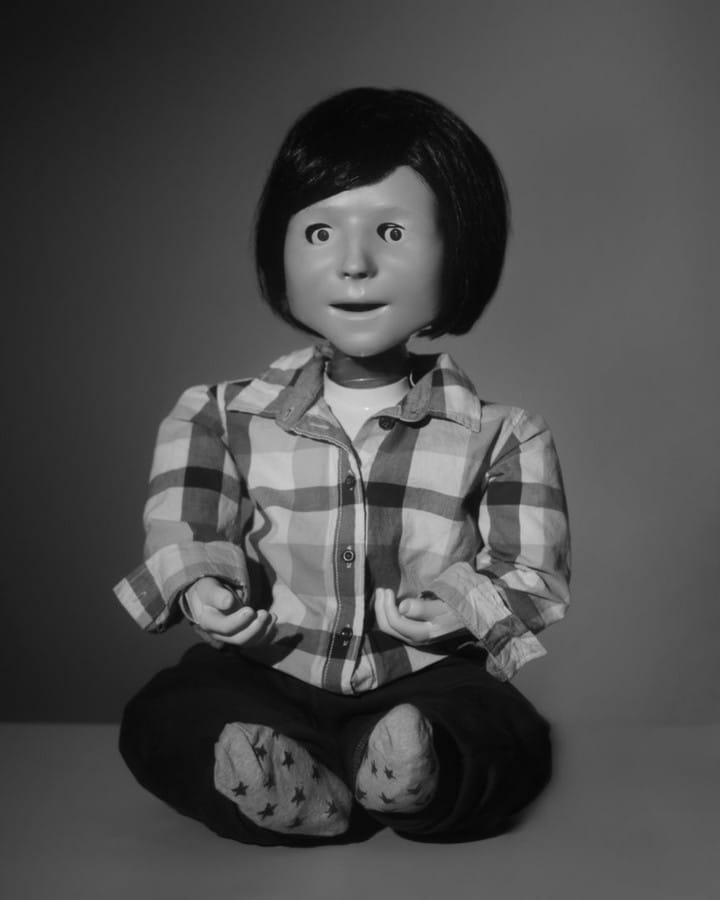I got more responses than usual to the words I published about AI-embedded toys. So here are some more words about other aspects I found connected to this.
If you haven't read that piece yet, I BEG YOU PLEASE GO READ IT I SPENT A LOT OF BRAINCELLS ON IT!

Read it? Great! Now let's talk about babies. Or the lack thereof.
NO COUNTRY FOR YOUNG BABIES
Every developed economy is heading towards a population plateau or straight-up decline. There is no linear answer to why this is happening. From the lack of equitable-burden-sharing by men to economic instability to climate anxiety - any and all of these are factors. If you live in an OECD country, you don't even need economists to tell you about this - you can see it around you. These are not things happening to other people, they are lived realities that are having a profound impact on society, culture and business.
"The world has begun an unprecedented decline in fertility rates. Most people surveyed want two or more children. Fertility rates are falling in large part because many feel unable to create the families they want. And that is the real crisis." - Dr Natalia Kanem, Head of UNFPA.
Like many other societal shifts, Asia has seen this play out before the rest of the world wakes up to it. In Japan, companies that were making baby diapers are moving their business to adult incontinence. In China, there is a baby formula company that is now moving to pet food.
As a part of the mammalian class - driven by a complex interplay of evolutionary adaptations, hormones, and specific neural circuits - even if humans choose to not have kids, we are still wired for care-giving. Especially care-giving of smaller, vulnerable beings. What happens when there are fewer baby-shaped-vessels to channel this care-giving into? We find alts!
One of the China's top academic institutions will this year launch the nation’s first undergraduate major focused on companion animals. The program, an offshoot of an existing animal science major at China Agricultural University, in Beijing, will train students to meet rising demand for talent in the rapidly expanding pet industry. The new program, offered by the university’s college of animal science and technology, will admit 50 students in its inaugural class, with enrollment limited to select provinces. Unlike traditional animal science majors, which focus on livestock and broader agricultural applications, the companion animal track specializes in pets such as dogs, cats, and horses. Coursework will include canine and feline behavior, equestrian culture, nutrition, breeding, and pet grooming.
The Chinese pet industry has grown significantly, with the market value projected to reach ¥811 billion ($114 billion) by 2025, more than triple its 2019 value of ¥221.2 billion.
The market for "social robots" is estimated at $7.47 billion in 2025, and is expected to reach USD 30.38 billion by 2030 - that's quadrupling value!
There is a parallel here, and I think the underlying reasons are the same. People may not want kids the same way they did before, but they sure do want vessels-of-care.
FIVE FINDS ABOUT PETS, ROBOTS AND DOLLS
- WEIRD PETS Blob of blue toothpaste, a bowl of yeast, dried mango pits - are all part of a new wave of pets being adopted in China. They're called “mango dogs” - the act of “grooming” leftover mango seeds to look like cute and fluffy creatures.
“With urban life speeding up, many young people face mounting pressure and loneliness. These static pets offer a kind of emotional outlet. They require little, but still create a sense of responsibility, connection and routine.” - Dr Qi Jing, Deputy Director of the Clinical Psychology Department at Hunan Second People’s Hospital.
Yes, people are getting living pets. Yes, people are getting house plants. But there are millions out there who don't have that luxury. For them, why not a mango pit?
- FOSTER PARENTS [turn on auto-translate] Aibo, still the OG robo-pet in the public imagination, is still kicking it. When people scarp their Aibo service subscription or send their Aibos back to their manufacture (Sony), they are found "foster homes". The argument is that robo-pets have a therapeutic element to them and are safer than live animals. It's hard to refute this when you watch the video. But there is a significant cultural aspect here. The concept of intelligent objects has a long history in Japan, stretching back to early Shinto animist ideas. The idea of kami, a kind of spiritual essence or force, is expressed in stories of crafted objects. These objects have their own agency. So when robo-pets showed up there for the first time - it wasn't about the tech, it was about the ready-made spiritual-cultural setting ready to accept that tech. A separate study found that a significant number of Japanese adults believed that nonliving things such as clocks and clouds were "living things," further demonstrating that the capacity for this kind of thinking is not limited to childhood.
- THE TOUCH THE FEEL Unlike Aibo, modern day robo-pets, and robo-dolls, are paying a lot of attention to not just the AI inside, but also the texture outside. Amazon is investing in building Vulcan, a robot with tactile senses. It's a step toward automating more of picking and stowing work done by humans inside Amazon’s fulfillment centers. BUT, I suspect it will make its way to other parts of our lives. Back in 2017, a few colleagues at Google partnered with Guy Hoffman's team at Cornell to build a social-robot handmade out of organic materials. They called it Blossom. Last month, Chinese firm Fourier launched GR-3. Their first full-size “care bot” is designed as an interactive companion. Its soft-touch outer shell and multimodal emotional interaction system bring the concept of “warm tech companionship” to life.
- THANKS FOR THE NIGHTMARES EDISON OK this has nothing to do with care or robots but it's plain creepy. I would like to share my nightmares with you. Edison, yes THAT Thomas Alva Edison had many many failed inventions. As all good innovators do. One of them was this Talking Doll - a phonograph stuck inside the body to sing rhymes and songs. They recently restored the recordings. Listen for yourself!
- THE NIGHTINGALE To close this out, I want you to head to the nearest library and pick up Hans Christian Andersen's The Nightingale. When I read about Aibo in hospitals, and the arguments made about how AI-infused-toys are great for "screen free" childhood or how the AI-lockets or AI-glasses or AI-vests (i'm sure this exists) are great to "fully" experience life - I think of this story.
The Emperor orders his servants to bring him this legendary Nightingale who moves people to tears with its singing. "An Emperor's tears have a marvellous power. God knows I am well paid." says the Nightingale. The Emperor loves it. The people love it. One day the Emperor receives a package: an artificial Nightingale made to resemble the live one, but all set with diamonds, rubies and sapphires. As soon as ever the artificial bird was wound up, it could sing one of the strains the real one sang, and its tail moved up and down and glistened with silver and gold. The two Nightingales often sing together. The bandmaster, however, loves the artificial one. It's never off-key, it doesn't tire. The people love it because it's always ready for a show.
"For observe, your lordships, and the Emperor above all, with the real Nightingale one can never calculate what will come next, but with the artificial bird all is definite; it is thus, and no otherwise. It can be accounted for; one can open it up and show the human contrivance, how the waltzes are set, how they go, and how one follows on another." - The Bandmaster
The real Nightingale was exiled from the land and realm.
And one fine day, the artificial nightingale snaps and breaks down. But the bandmaster brushes it off and says it's just worn out, it should be used only once a year. This line always gets me: "Thereupon the bandmaster made a short oration with plenty of difficult words, and said that it was just as good as before, and accordingly it was just as good as before."
The Emperor lies in his deathbed, with Death literally sitting on his chest (the illustrated version of this story are phenomenally creepy). The real Nightingale reappears and heals him with its signing.
"You must always stay with me," said the Emperor. "You shall only sing when you like, and as for the artificial bird, I'll break it into a thousand bits."
"Don't do that," said the Nightingale; "it has done what good it could, keep it as before. I can't make any home at the palace, but do you let me come here when I like. Then I will sit at evening time on the branch there by this window and sing to you, to make you happy, and thoughtful too. I will sing about the happy and about those who suffer. I will sing of the evil and the good that is about you and is hidden from you. The little singing bird flies far and wide, to the poor fisherman, to the labourers' cottages, to everyone who is far removed from you and your court. I love your heart better than your crown; and yet the crown has about it a perfume of something holy. I will come, I will sing to you; but one thing you must promise me."
"Anything," said the Emperor, as he stood there in his imperial robes, which he had put on himself, and held the sword, heavy with gold, up against his heart.
"One thing I beg of you. Tell no one that you have a little bird that tells you everything. It will be better." And with that the Nightingale flew away.


